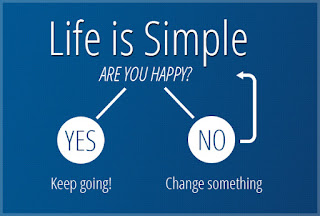Thursday, April 7, 2016
Tuesday, April 5, 2016
Saturday, April 2, 2016
Monday, March 28, 2016
Are You Happy?
We know that emotions are contagious. Research by Harvard’s Nicholas Christakis and UC San Diego’s James Fowler has shown that happiness is contagious, for example. If you have a friend who is happy, the probability that you will be happier rises by 25%. One can only image what a few more happy friends could do for an individual!
Saturday, March 19, 2016
Deliberately or Accidentally?
If you were never presented with some advantage to be gained
by dishonesty, such as recognition, or money, or a better grade on a test or
avoidance of punishment or embarrassment, you could never develop integrity.
If
no one ever offended you, you could never learn to forgive or internalize mercy.
Were you never wearied by the annoying behavior of another or the repeated
failures of someone else you could never become patient.
Were you never
subjected to the appetites and passions of the physical body for food, for
water and for sexual fulfillment you could not develop self-mastery.
Without opposition
the plan would be frustrated, you could not progress and the purpose of life
would be unachievable.
In short when you choose to follow Christ you move forward
and assimilate attributes of light; when you do not, you move backward and
acquire attributes of darkness.
Can you see, have you seen, who you want to be? What will
happen if you don't plan? What will happen if you have no vision of who you
want to become?
There are two ways of evolving: deliberately and
accidentally. You can either decide who you want to become and deliberately
work toward that end, or you can just go with the flow and become whatever life
makes of you. In that event, you will become whatever the fickle circumstances
and forces of life and society will make of you; whatever is currently
considered to be popular or in; whatever is easiest. But, whatever you become
accidentally it will not be nearly the full measure of our potential. You will
become just someone, somewhere in the middle.
Monday, February 22, 2016
Tolerance and Love
We
must recognize at the outset that there is a difference between tolerance and
tolerate. Your gracious tolerance for an individual does not grant him or her
license to do wrong, nor does your tolerance obligate you to tolerate his or
her misdeed. That distinction is fundamental to an understanding of this vital
virtue.
Neighboring
factions, whether they be identified as groups or gangs, schools or states,
counties or countries, often develop animosity. Such tendencies make me wonder:
Cannot boundary lines exist without becoming battle lines? Could not people
unite in waging war against the evils that beset mankind instead of waging war
on each other?
Risks
of Boundless Tolerance
An erroneous assumption could be made
that if a little of something is good, a lot must be better. Not so! Overdoses
of needed medication can be toxic. Boundless mercy could oppose justice. So
tolerance, without limit, could lead to spineless permissiveness.
The
Lord drew boundary lines to define acceptable limits of tolerance. Danger rises
when those divine limits are disobeyed. Just as parents teach little children
not to run and play in the street, the Savior taught us that we need not
tolerate evil. “Jesus went into the temple of God, and … and overthrew the tables
of the moneychangers.” Though He loved the sinner, the Lord said that He
“cannot look upon sin with the least degree of allowance.” His Apostle Paul
specified some of those sins in a letter to the Galatians. The list included
“adultery, fornication, uncleanness, lasciviousness,
“Idolatry,
witchcraft, hatred, … wrath, strife, seditions, heresies,
“Envyings,
murders, drunkenness, revellings, and such like.”
To
Paul’s list we might add the regrettable attitudes of bigotry, hypocrisy, and
prejudice.
“We
call upon all people everywhere to recommit themselves to the time-honored
ideals of tolerance and mutual respect. We sincerely believe that as we
acknowledge one another with consideration and compassion we will discover that
we can all peacefully coexist despite our deepest differences.”
Taken
from “Teach Us Tolerance and Love” by Russell M. Nelson.
Complete discourse
available at:
https://www.lds.org/general-conference/1994/04/teach-us-tolerance-and-love?lang=eng
Saturday, February 20, 2016
Subscribe to:
Posts (Atom)








